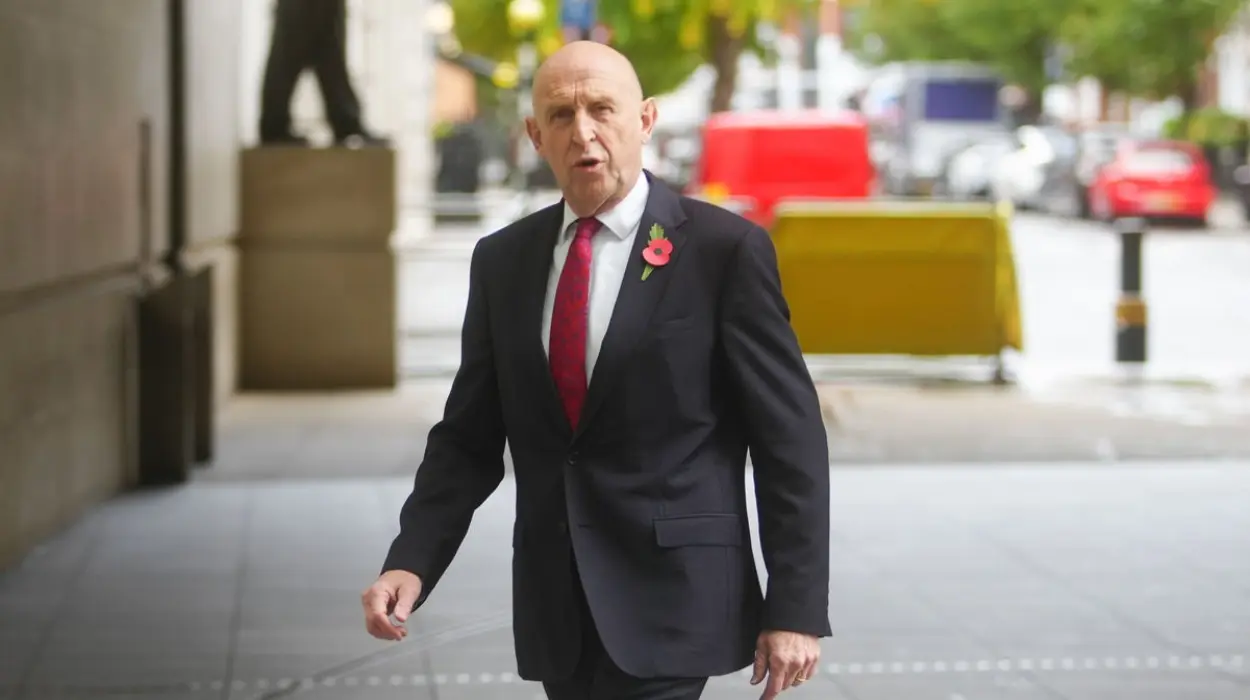UK (Parliament Politics Magazine) – Defence Secretary John Healey warned recent weak forecasts carry Budget “consequences” and declined to confirm Labour’s manifesto tax pledges.
As reported by The Independent, a Cabinet minister warned weak economic forecasts may impact the upcoming Budget while avoiding a repeat of Labour’s tax commitments.
How did John Healey describe the economic outlook ahead of the Budget?
John Healey said no final decisions have been made on the Budget, with Chancellor Rachel Reeves set to present it on November 26.
The Defence Secretary stated that the Office for Budget Responsibility’s review shows deeper economic “scarring” than earlier estimates, and the Chancellor will outline plans to address the challenges.
During an interview, when asked if the Government would stick to its manifesto promise on income tax, national insurance, and VAT, Mr Healey declined to repeat the pledge.
He said,
“That’s for the Budget and that’s for the Chancellor to announce at the end of the month.”
Questioned again on Labour’s tax pledge, Mr Healey responded,
“No decisions have been taken about the Budget, even the Office of Budget Responsibility hasn’t produced its final figures.”
The defence secretary stated,
“But what we do know is that they now see the deep damage and scarring to be much more serious than previously thought, a combination of years of cuts, Covid and really slow economic growth over 14 years.”
He added,
“So there are consequences. Things do change, and we’ll have the announcements that are needed to deal with those challenges in the Budget.”
Mr Healey insisted that the Chancellor’s upcoming Budget would follow her fiscal framework, address cost-of-living pressures, and support economic growth.
The comments come after a week in which Prime Minister Sir Keir Starmer avoided repeating Labour’s tax pledge, amid rumours circulating that Ms Reeves could raise income tax.
What did Keir Starmer say about possible tax rises in next month’s Budget?
The Prime Minister has not ruled out increased taxes in the upcoming Budget, fueling speculation that Rachel Reeves may hike income tax to address a fiscal gap.
During this week’s PMQs, Mr Starmer ignored questions from Tory leader Kemi Badenoch about Labour’s manifesto pledge.
Ms Badenoch asked,
“Last year in its manifesto, Labour promised not to increase income tax, not to increase national insurance and not to increase VAT. Does the prime minister still stand by his promise?”
In his reply, the Prime Minister praised the economy’s performance but avoided discussing taxes, unlike previous assurances to stick to the manifesto.
He said,
“The budget is on 26 November, and we will lay out our plans, but I can tell the house now that we will build a stronger economy, we will cut NHS waiting lists and deliver a better future for our country.”
Ms Badenoch replied,
“That is a fascinating answer. It is not the same answer that I received when I asked exactly the same question, word for word, on 9 July. Then the prime minister replied with just one word, “Yes”, and then he sat down with a smug grin on his face. What’s changed in the past four months?”
The prime minister responded,
“As she well knows, no prime minister or chancellor will ever set out their plans. They broke the economy. We’re fixing it.”
What tax moves might Rachel Reeves consider to fill £20bn Budget gap?
The Office for Budget Responsibility is expected to lower its UK productivity forecast this month, which could add around £20 billion to the Chancellor’s fiscal burden.
The shortfall adds to an already deep gap in her spending plans, fuelled by rising debt interest, stubborn inflation, and costly pledges such as restoring winter fuel payments and reversing benefit cuts.
The bill could climb further if the chancellor lifts the two-child benefit cap and extends the existing freeze on fuel duty.
Ms Reeves, who has vowed to steer clear of fresh spending cuts, is expected to unveil new tax measures when she presents the Budget later this month.
Economists argue that raising income tax is the most effective way to close the funding gap, warning that increasing several smaller taxes could weaken the economy.


